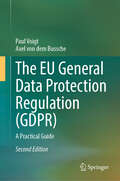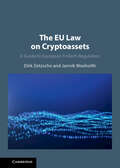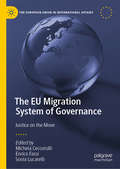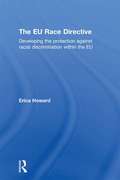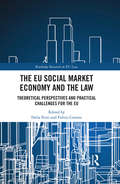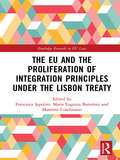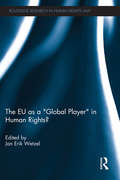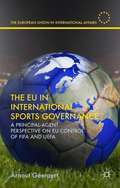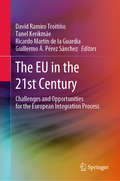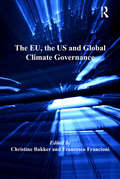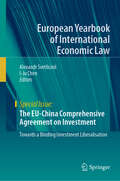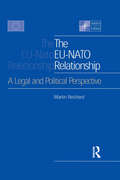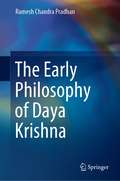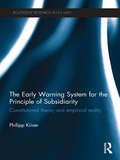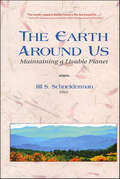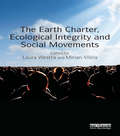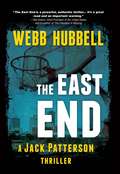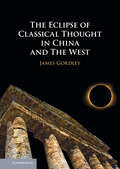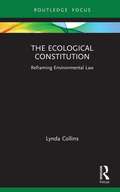- Table View
- List View
The EU General Data Protection Regulation (GDPR): A Practical Guide
by Paul Voigt Axel von dem BusscheSix years have passed since the General Data Protection Regulation (GDPR) entered into force. With its numerous data protection obligations and the threat of high fines, companies had to change their approach to data protection. It has been an ongoing challenge for companies to keep up with the constant changes deriving from a plethora of new decisions by courts and supervisory authorities. The 2nd Edition of this book provides a practical overview of the requirements of the GDPR. Examples, tables, and checklists showcase the requirements of the GDPR, whilst also giving practical tips to tackle the regulatory challenges. The handbook examines the GDPR’s scope of application, the organisational and material requirements of the GDPR, the rights of data subjects, the role of the supervisory authorities, and enforcement and fines. The book has been completely revised for the second edition and takes extensive account of new data protection case law and regulatory guidelines.
The EU Law on Crypto-Assets: A Guide to European FinTech Regulation
by Dirk Zetzsche Jannik WoxholthThis book provides a comprehensive guide to EU regulation of crypto-assets and FinTech regulation more broadly. The authors explain the need for regulation in an accessible manner and against the background of the instances now dubbed the 'Crypto Winter', when millions of crypto investors lost billions of value due to technical malfunctions, misconduct, and fraud. They combine an in-depth perspective on the bespoke regulations of crypto-assets provided in the EU's Markets in Crypto-Assets Regulation (MiCA) and Pilot Regulation with the revised EU's AML/CTF legislation, operational risk regulation (DORA), and private law. They conclude by analysing how the combined new EU financial regulation addresses the causes of the Crypto Winter, and which risks remain despite the plethora of new policy action. Co-written by a world-leading FinTech expert, the book will be a go-to source for researchers and practitioners and a crucial guide for those navigating the field of crypto-assets.
The EU Migration System of Governance: Justice on the Move (The European Union in International Affairs)
by Michela Ceccorulli Sonia Lucarelli Enrico FassiThis book explores the norms, practices, and main actors in the EU Migration System of Governance (EUMSG). Bringing a fresh perspective to the analysis of asylum and migration in Europe, the volume unpacks the European Union’s approach to migration and points to the principles and actions of EU member states. Moreover, it explores the EUMSG’s performance through the lenses of three alternative yet coexistent understandings of justice (non-domination, impartiality, and mutual recognition), thereby overcoming a unilateral ethical viewpoint and moving away from the ‘open-closed borders’ debate.
The EU Race Directive: Developing the Protection against Racial Discrimination within the EU
by Erica HowardIn 2000, the European Union adopted a Directive against discrimination on the grounds of racial or ethnic origin. This book provides an in-depth evaluation of the Race Directive and its effects, questioning how successful the Race directive has been. The EU Race Directive discusses the history of the fight against racial discrimination in the EU and the equality clauses in international Human Rights instruments. It then examines the terms race, racism and racial discrimination and equality in the Directive. The book also looks at the concepts of equality which can be distinguished in the Race Directive and in the subsequent developments at EU level. Examining whether the Directive has improved the protection against racial or ethnic origin discrimination for people within the EU, the book concludes with an assessment of how far the EU has come on the road to racial equality with the adoption of the Race Directive and the subsequent developments. It also contains proposals for possible improvements. The comprehensive and up-to-date analysis in this book goes beyond most other books written on the subject and the specific focus on racism and racial discrimination means a more thorough examination than most texts focusing on discrimination on a larger number of grounds. This book will be of great value to students and academics in (European) law, social sciences and human rights, researching racism, racial discrimination, ethnicity and race relations. It will also be useful for policy makers.
The EU Social Market Economy and the Law: Theoretical Perspectives and Practical Challenges for the EU (Routledge Research in EU Law)
by Delia Ferri Fulvio CorteseInvestigating the extent to which the European Union can be defined as a "highly competitive social market economy", this edited collection illustrates and tests the constitutional reverberations of Art. 3(3) of the Treaty on the European Union, and discusses its actual and potential transformative effect. In the aftermath of Brexit, and in the 60th anniversary of the Treaty of Rome, the book is particularly timely and topical, offering new and deeper insights on the complex and constantly evolving social dimension of the EU, ultimately reflecting on how the objective of (re)constituting the EU as a "highly competitive social market economy" might best be achieved.
The EU Succession Regulation
by Calvo Caravaca Alfonso-Luis Angelo Davì Mansel Heinz-PeterThe European Succession Regulation is a landmark in the field of EU private international law. It unifies the conflicts of laws, jurisdiction and recognition of foreign judgments and some other legal instruments in the field of succession and wills. This volume provides an article-by-article commentary on the individual provisions of the Regulation, introduced by an overview of its general framework and underlying principles. As a reference tool for the Regulation, this book is intended to promote a high standard of interpretation and application. With contributions from leading scholars in the field, it uses a comparative approach in its analysis to enrich the academic debate and highlight the problems likely to arise in the practical application of the Regulation.
The EU and the Proliferation of Integration Principles under the Lisbon Treaty (Routledge Research in EU Law)
by Francesca Ippolito Maria Eugenia Bartoloni Massimo CondinanziThe entry into force of the Lisbon Treaty has brought about a proliferation of “integration principles”. In addition to the environmental integration principle, which has been part of the EU legal framework for some time, the Lisbon Treaty introduced the principles of gender equality integration, social policy integration, non-discrimination integration, consumer protection integration as well as animal welfare integration. Furthermore, a general principle of integration policy objectives is contained in Article 7 TFEU, requiring that the Union must ensure consistency between its policies and activities, taking all relevant policy requirements listed under the TFEU into account in the adoption of any legislative measure. These integration principles must be pursued, or at least taken into account, when decisions are being taken in almost any area of EU policy-making. However, there is considerable uncertainty regarding the normative implications of the various integration principles as well as their legal value and practical relevance for EU policymaking. This book addresses the implications of the proliferation of sectorial integration principles and the introduction of a universal requirement of policy consistency in terms of the division of competences between the Union and the Member States as well as the scope for judicial review of the EU legislative process. In particular, it explores whether the introduction of various integration principles has led to an extension of Union competences and whether it has limited the scope for judicial review by extending the discretionary power of the Union institutions.
The EU as a 'Global Player' in Human Rights? (Routledge Research in Human Rights Law)
by Jan Erik WetzelThe Treaty of Lisbon has endowed the EU with a normative human rights framework that confirms recognition as a fully-fledged regional mechanism for the protection of human rights. The aim of this book is to contribute to the growing discussion of the external human rights dimension of the European Union. Its theme sits at the crossroads between International and EU law, Human Rights, and Political Science. In moving beyond well-covered topics such as the protection of human rights within the EU, or their relevance for the accession of new Member States, this book asks the broader question of whether EU human rights law has any real relevance on a global scale. In total, The EU as a 'Global Player' in Human Rights gives an overview of the international relevance of EU human rights law by means of exemplary case-studies of the EU’s institutional and substantive protection of human rights, whilst consideration of non-European perspectives from China and Japan underline its global focus. This book will be of particular interest to researchers, students, and practitioners in International and European law, Human Rights Law, European studies and International Relations.
The EU in International Sports Governance: A Principal-agent Perspective Of Eu Control Of Fifa And Uefa (The European Union in International Affairs)
by Arnout GeeraertThis book demonstrates that the European Union (EU) can curtail the autonomy of FIFA and UEFA by building upon insights from the principal-agent model. The author argues that EU institutional features complicate control, but do not render the EU powerless, and that FIFA and UEFA can deploy a variety of strategies to mitigate control.
The EU in the 21st Century: Challenges and Opportunities for the European Integration Process
by Tanel Kerikmäe David Ramiro Troitiño Ricardo Martín de la Guardia Guillermo Á. Pérez SánchezIn the light of Brexit, the migration crisis, and growing scepticism regarding the European integration process, this book offers a comprehensive overview of the most pressing problems facing the European Union in the 21st century. Written by experts from various disciplines, the contributions cover a wide range of economic, legal, social and political challenges, including populism, migration, Brexit, and EU defence, foreign policy and enlargements. Each paper includes a historical account, insights into the problems and challenges confronting the EU, and an assessment of the institutions and policy instruments applied by the EU in response. Discussing each of the problems as part of a process – including the historical roots, current situation and potential solutions – the book allows readers to gain an understanding of the European Union as a living project.
The EU, the US and Global Climate Governance
by Francesco Francioni Christine BakkerThis volume presents a critical analysis of transatlantic relations in the field of environmental governance and climate change. The work focuses on understanding the possible trends in the evolution of global environmental governance and the prospects for breaking the current impasse on climate action. Drawing on research involving experts from eleven different universities and institutes, the authors provide innovative analyses on policy measures taken by the EU and the US, the world’s largest economic and commercial blocs, in a number of fields, ranging from general attitudes on environmental leadership with regard to climate change, to energy policies, new technologies for hydrocarbons extraction and carbon capture, as well as the effects of extreme weather events on climate-related political attitudes. The book examines the way in which the current attitudes of the EU and the US with regard to climate change will affect international cooperation and the building of consensus on possible climate policies, and looks to the future for international environmental governance, arguably one of the most pressing concerns of civilisation today. This book, which is based on research carried out in the context of the EU-financed FP7 research project TRANSWORLD, will appeal to academics, policy makers and practitioners seeking a deeper understanding of the challenges resulting from climate change.
The EU-China Comprehensive Agreement on Investment: Towards a Binding Investment Liberalisation (European Yearbook of International Economic Law)
by Alexandr Svetlicinii I-Ju ChenThis book discusses the major features of the EU-China Comprehensive Agreement on Investment (CAI) and its likely impact on investment liberalisation in China, Europe’s largest trading partner. The principal aim of the book is to evaluate the progress of the investment liberalisation efforts pursued by the negotiators of the CAI. Part I, “Geopolitical Origins and Negotiations of the EU-China Comprehensive Agreement on Investment”, examines the interests, motivations, and expectations of the parties during the negotiation process and following the agreement in principle on the CAI. Part II, “Substantive Issues of the EU-China Comprehensive Agreement on Investment”, considers specific focus areas that are critical for the mutual opening of the European and Chinese markets for foreign investors. Part III, “Dispute Resolution Mechanisms of the EU-China Comprehensive Agreement on Investment”, reviews the applicability and effectiveness of the available dispute settlement and treaty enforcement mechanisms provided for in the CAI including investor-state dispute settlement, state-to-state dispute settlement, and non-adversarial methods. The book offers a combination of theoretical perspectives that will be of interest to international economic law scholars and provides practical insights on how the CAI is likely to shape the investment landscape for European businesses in China.
The EU-NATO Relationship: A Legal and Political Perspective
by Martin ReichardThe EU-NATO relationship continues to develop at a time of significant change for both organizations. Post 9/11, NATO embarked on a fundamental transformation, recasting itself as an organization with global strategic reach and interest, focused less on Europe than ever before. At the same time, the EU is also becoming a more global political actor. Consequently, there is growing evidence that over time the EU will take the primary place in providing military security in Europe. This volume combines political and legal methods to provide a comprehensive analysis of the current and likely future relationship between the EU and NATO. The work will be of interest to all those interested in the development of these two major organizations and international security more generally, whether from a political or legal perspective.
The Early Philosophy of Daya Krishna
by Ramesh Chandra PradhanThis book deals with the philosophy of Daya Krishna, an Indian philosopher of the twentieth century. It discusses the central issues in Daya Krishna’s early philosophy as a synthesis of the Indian and Western philosophical methods. It presents problems of the past and the present in a holistic frame of creative philosophizing. It provides a glimpse into the issues human beings face in all vital areas of human civilization. It discusses the nature of philosophy and the philosophical method in Daya Krishna’s syncretic philosophy. Issues such as self and freedom and ethics and religion are explored in the chapters. It is of interest to those who are engaged with Indian philosophy and Indian philosophers of the twentieth century and especially to those whose interest lies in understanding the cultural East and its philosophical responses to the cultural West.
The Early Warning System for the Principle of Subsidiarity: Constitutional Theory and Empirical Reality (Routledge Research in EU Law)
by Philipp KiiverThis book offers a comprehensive systematic analysis of the European Union’s Early Warning System (EWS) for subsidiarity, which was introduced by the Treaty of Lisbon. The book includes both a detailed theoretical analysis of the EWS as well as an assessment of how national parliaments have responded to EU legislative proposals under the system. Philipp Kiiver explores whether the EWS could function as a mechanism of legal accountability offering a partial remedy to the European Union’s much-discussed accountability deficit. The Early Warning System for the Principle of Subsidiarity provides an overview of the historical developments of national parliamentary involvement in the EU and also considers the broader implications of the EWS, including its relationship to democracy and legitimacy. The book will be of particular interest to academics and students of EU Law, Constitutional Law and Political Science.
The Earth Around Us: Maintaining A Livable Planet
by Jill SchneidermanSoil contamination...public lands...surface and groundwater pollution...coastal erosion...global warming. Have we reached the limits of this planet's ability to provide for us? If so, what can we do about it?These vital questions are addressed by Jill Schneiderman in The Earth Around Us, a unique collection of thirty-one essays by a diverse array of today's foremost scientist-writers. Sharing an ability to communicate science in a clear and engaging fashion, the contributors explore Earth's history and processes--especially in relation to today's environmental issues--and show how we, as members of a global community, can help maintain a livable planet. The narratives in this collection are organized into seven parts that describe:- Earth's time and history and the place of people in it- Views of nature and the ethics behind our conduct on Earth- Resources for the twenty-first century, such as public lands, healthy forests and soils, clean ground and surface waters, and fluctuating coastlines- Ill-informed local manipulations of landscapes across the United States- Innovative solutions to environmental problems that arise from knowledge of the interactions between living things and the Earth's air, water, and soil- Natural and human-induced global scale perturbations to the earth system- Our responsibility to people and all other organisms that live on EarthNever before has such a widely experienced group of prominent earth scientists been brought together to help readers understand how earth systems function to produce our physical and biological environment. Driven by the belief that earth science is, and should be, an integral part of everyday life, The Earth Around Us empowers all of us to play a more educated and active part in the search for a sustainable future for people and other living things on our planet.
The Earth Charter, Ecological Integrity and Social Movements
by Laura Westra Mirian VilelaThe Earth Charter is a declaration of fundamental ethical principles for building a just, sustainable and peaceful global society, with ecological integrity as a major theme. This book provides a series of analyses of ecological integrity as it relates to the Earth Charter, social movements and international law for human rights. It is shown how the Earth Charter project began as a United Nations initiative, but it was carried forward and completed by a global civil society initiative. The drafting of the Earth Charter involved the most inclusive and participatory process of its time ever associated with the creation of an international declaration. This process is the primary source of its legitimacy as a guiding ethical framework. The Earth Charter was finalized and then launched in 2000 and its legitimacy has been further enhanced by its endorsement by over 6,500 organizations, including many governments and international organizations. In the light of this legitimacy, an increasing number of international lawyers recognize that the Earth Charter is acquiring the status of a soft law document. The book also shows the strong connection between ecological integrity and social justice, particularly in the defence of indigenous people, and includes contributions from both the North and the global South, specifically from Central and South America.
The Earth and I
by Arthur FirstenbergAlmost all environmental books treat the environmental crisis as though humans are in charge of nature, rather than part of it. The Earth and I is the first book to put all preconceived notions aside and to ask, naïvely: Who are we really? What is our relationship to the earth? How is it possible that we, out of all the millions of species, have come to destroy our common home? The answers are surprising and have far-reaching implications for those searching for solutions. Part One tells what is happening to the earth&’s systems and how they are being destroyed. It rewrites the two-million-year history of humanity&’s tenure on the earth as if we are part of nature and not separate from it, and describes both the earth and the universe as living systems. It paints a global, coherent picture of the devastation to Earth&’s air, water, forests, and creatures that is not found elsewhere. It reviews assaults on these systems that are not treated adequately, if at all, elsewhere: chemicals; radiation; plastics; detergents; biocides; noise; cars; and guns. Part Two, &“Digging below the Surface,&” asks why, and enters territory not previously explored by environmentalists. It describes the various ways to make a living on the earth—hunting and gathering, shifting agriculture, nomadic herding, settled agriculture, and industrial technology—as choices, not eras—choices coexisting with one another until today. It rewrites economics. It explores the relationship of warfare, slavery, religion, and human sexuality to the environmental crisis. And it is forced to conclude that these aspects of human culture are not only shaped, but created by the technologies we use; that the use of non-human sources of energy interferes with human psychological development; and that the unfulfilled urges within us explode in the violent technologies that are destroying our planet. The solutions, if it is not too late, therefore lie in wise choice, rather than wise use, of our technologies.
The East End (A Jack Patterson Thriller #5)
by Webb HubbellJack Patterson returns to Little Rock at the request of his boyhood friend Sam Pagano, but when Jack arrives, he’s abducted and taken to a remote swamp where he’s beaten and lynched by men set on revenge. Clovis Jones, his friend and bodyguard, finds Jack near death and gets him to a hospital. As Jack recovers, he learns Sam’s college sweetheart, Jana Hall, is now a doctor who established and ran Arkansas’s health clinics for the poor including one in Little Rock’s East End. Jana’s efforts stepped on the toes of some powerful people, including someone who wants her clinics shut down, her medical practice ended, and for her to spend the rest of her life in jail. Meanwhile, someone has killed the men who tried to lynch Jack, and Jack is the prime suspect in the murders. To make matters worse, Jack must defend Jana without the aid of his trusted assistant, Maggie, and his usual co-counsel, Micki Lawrence. Jack faces an unethical special prosecutor, a judge on the take, and the shadowy power broker bent on destroying Dr. Hall and her health clinics. Why Jana has become such a target, no one seems to know. Every time Jack thinks he has caught a break or sees a way to exonerate Dr. Hall, his adversaries or his client put a new obstacle in his path, including a second killer bent on settling an old score. Jack’s courtroom tactics fail, his client wants to plead guilty to protect her patients, and in a last-ditch effort to overcome the long odds against his client he resorts to a complicated and dangerous strategy. The strategy will either save Jana’s life and reputation, or get Jack disbarred, his client put away for life, or worse—get Jack killed.
The Easy Section 609 Credit Repair Secret: Remove All Negative Accounts In 30 Days Using A Federal Law Loophole That Works Every Time
by Brandon WeaverBrandon spent many years struggling with poor credit, but he cleaned it up with The Section 609 Credit Repair Secret. You don't need to spend any money on attorneys and credit repair companies. The secret is revealed here and it works every time. This book will teach you the incredibly easy process the professionals are using and charging thousands of dollars for. A simple step-by-step guide to remove all derogatory items on your credit reports, even if they do belong to you! Are charge-offs, repos, bankruptcies, judgments, short-sales, loan modifications, late payments, and collection accounts preventing you from receiving the life you deserve? This book will make your creditors fear you and not the other way around.This book includes DISPUTE LETTER TEMPLATES to dispute your adverse accounts.100% Legal & Proven Method.Improve credit from very poor to EXCELLENT. FICO Scores from below 500's to above 700's.What to do, when to do it, and how to do it.Step by step instructions how to fill out your dispute letters.How to mail the letters to the CRA'sHow to respond with a 4 step letter writing system to CRA's.Very easy to do.This will help you fix your credit and get you the life you deserve.This is the stuff creditors don't want you to know! THIS WILL SAVE YOU MONEY AND BRING YOU FINANCIAL FREEDOM. If you're tired of dreaming of a better life and want one now, it's time to use The Section 609 Credit Repair Secret.
The Eclipse and Recovery of Beauty
by John DadoskyAccording to the Swiss theologian Hans Urs von Balthasar, a world that has lost sight of beauty is a world riddled with skepticism, moral and aesthetic relativism, conflicting religious worldviews, and escalating ecological crises. In The Eclipse and Recovery of Beauty, John D. Dadosky uses Kierkegaard and Nietzsche's negative aesthetics to outline the context of that loss, and presents an argument for reclaiming beauty as a metaphysical property of being.Inspired by Bernard Lonergan's philosophy of consciousness, Dadosky presents a philosophy of beauty that is grounded in contemporary Thomistic thought. Responding to Balthasar, he argues for a concept of beauty that can be experienced, understood, judged, created, contemplated, and even loved.Deeply engaged with the work of Aquinas, Kierkegaard, Nietzsche, and Kant, among others, The Eclipse and Recovery of Beauty will be essential reading for those interested in contemporary philosophy and theology.
The Eclipse of Classical Thought in China and The West
by James GordleyFor centuries, the starting points for serious thought about ethics, justice, and government were traditions founded, in China by Confucius, and in the West by his near contemporary Socrates. In both classical traditions, norms were based on human nature; to contravene these norms was to deny part of one's humanity. The Chinese and Western philosophical traditions have often been regarded as mutually unintelligible. This book shows that the differences can only be understood by examining where they converge. It describes the role of these traditions in two political achievements: the formation of the constitutions of Song dynasty China and the American Republic. Both traditions went into eclipse for similar reasons but with quite different consequences: in China, the growth of absolutism, and in the West, the inability of modern political and ethical thought to defend the most fundamental values.
The Ecological Constitution: Reframing Environmental Law (Routledge Focus on Environment and Sustainability)
by Lynda CollinsThe Ecological Constitution integrates the insights of environmental constitutionalism and ecological law in a concise, engaging and accessible manner. This book sets out the necessary components of any constitution that could be considered "ecological" in nature. In particular, it argues that an ecological constitution is one that codifies the following key principles, at a minimum: the principle of sustainability; intergenerational equity and the public trust doctrine; environmental human rights; rights of nature; the precautionary principle and non-regression; and rights and obligations relating to a healthy climate. In the context of the global environmental crisis that characterises the current Anthropocene era, these principles are important tools for changing consciousness and driving pragmatic policy reforms around the world. Re-imagining constitutions along these lines could play a vital role in the collective project of building a sustainable future for humans, animals, ecosystems and the biosphere we all share. This book will be of great interest to students and scholars of environmental law, ecological law, environmental constitutionalism, sustainability and rights of nature.
The Ecology of Childhood: How Our Changing World Threatens Children’s Rights (Families, Law, and Society #9)
by Barbara Bennett Woodhouse2021 Outstanding Academic Title, Choice MagazineHow globalization is undermining sustainable social environments for children This book uses the ecological model of child development together with ethnographic and comparative studies of two small villages, in Italy and the United States, as its framework for examining the well-being of children in the aftermath of the Great Recession. Global forces, far from being distant and abstract, are revealed as wreaking havoc in children’s environments even in economically advanced countries. Falling birth rates, deteriorating labor conditions, fraying safety nets, rising rates of child poverty, and a surge in racism and populism in Europe and the United States are explored in the petri dish of the village. Globalism’s discontents—unrestrained capitalism and technological change, rising inequality, mass migration, and the juggernaut of climate change—are rapidly destabilizing and degrading the social and physical environments necessary to our collective survival and well-being. This crisis demands a radical restructuring of our macrosystemic value systems. Woodhouse proposes an ecogenerist theory that asks whether our policies and politics foster environments in which children and families can flourish. It proposes, as a benchmark, the family-supportive human-rights principles of the UN Convention on the Rights of the Child. The book closes by highlighting ways in which individuals can engage at the local and regional levels in creating more just and sustainable worlds that are truly fit for children.
The Ecology of Commerce: A Declaration of Sustainability
by Paul HawkenA visionary new program that businesses can follow to help restore the planet.
